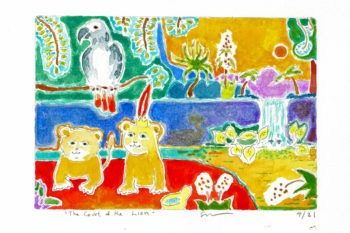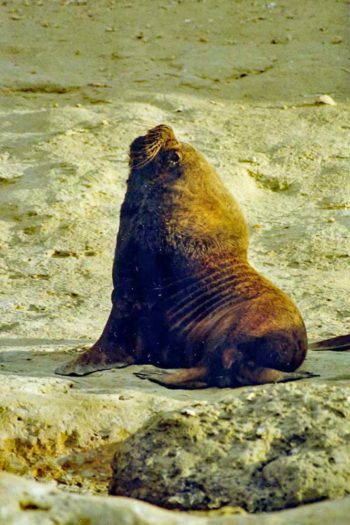The Court of the Lion
Originally told by the people of Mbomo and recorded by S.R. Kovo N’Sondé, based on sociological and mythological sources.
Retold in Dutch by Heidi Muijen and Tess van Dongen ― and translated into English by Greg Suffanti
If you listen carefully to water falling on iron anvils, you can hear the roar of a lion. Yet in no body of water, jungle or savannah is there a lion to be found.
South of Djambala is the village Nkwe Mbali. There, you can hear the waters of the river Lefini murmuring and singing sweet melodies. What you hear are not just the sounds of the river and the heavenly rains, but the beautiful, repetitive melody of the waterfalls and the river Lefini, which gracefully glides past the round hills of Mbaun. These holy waters are venerated by the people of Nzi. From Zanaga to Membé, the elders of the villages claim that there are two mysterious anvils hidden behind the falls, which amplify the furious and majestic roar of the falling waters.

Long ago, before humanity even existed, there were two young lions, Ngambu and Ngampika. When they were still young cubs they were separated from their parents. Their father had been killed by a rival lion in a battle for leadership of the pride. To protect the young cubs from being killed by this new leader, their mother arranged for them to escape.
The young lions bravely fled their homeland, which now belonged to the new leader. Although the cubs’ manes were only half grown, they felt the hurt of mature lions for their loss and they wanted revenge. But what could they do? Even with the two of them, they would be easy prey and just a small snack for the new leader! Ultimately, they were alone and afraid.
The young lions wandered over sandy plains for weeks, roaming aimlessly here and there, covering every corner of the savannahs. Meanwhile, the moon had become full and had shrunk to a little sickle many times. As soon as Ngambu and Ngampika heard the slightest roar in the distance, they turned quickly in the opposite direction.
One morning, Ngambu was awakened by a flock of gray parrots perched above them, whose red tails were fluttering noisily about in the trees. These birds were speaking of a special place… a tempting and magical place; a place where the foaming streams gently murmured, whispered and sang sweet hymns as you approached; a sacred place where the water of life had colored the tips of their feathers red.
Ngambu sat raptured listening to the birds and waited patiently for his brother Ngampika to wake up so he could tell him about this incredible story from the grey parrots.
However, when Ngampika woke and opened his eyes, they shone with a strange light. He already knew everything, including what Ngambu had wanted to tell him about the sacred falls! In his dream he heard a strange voice and saw Ngambu’s reflection in the water, his crown adorned with a red feather from the Senegalese Spur cuckoo:
“Ngambu, let’s get to Mbaun quickly before night falls. There, a white hen and a rooster are waiting for us. I’ve seen all that and more in my dream. Follow me!”
Ngampika’s voice was solemn and serious, and Ngambu felt compelled to immediately agree to his brother’s mysterious request. The grey parrots showed them the way. As they walked further, they became increasingly bewitched by an extraordinary melody whose mystical music completely enveloped them. The grey parrots departed and the two cubs followed the source of the beautiful music, which they felt couldn’t be anything other than the song of the holy waters!
At last they arrived at the source of the music, just as the last rays of the sun were turning the foamy waters of the falls an incandescent red. On the banks of the river they saw a rooster and a hen; and in between the two sat half of a large yellow gourd, which was filled with water and had a red feather floating on top.
Suddenly, they heard a voice asking:
“Ngambu, look into the water: do you want to rule or take revenge?”
Ngambu turned questioningly to his brother. Ngampika motioned for him to listen to the water:
“Revenge breeds revenge! You fled from violence yourself, didn’t you? If you are going to rule without sharing, you will follow the path of a tyrant. “

Ngambu said:
“I want to rule with respect for others; only with the consent of others. “
At that moment the hen flew into the falls and in between the two almost hidden anvils, which now revealed themselves as dark, purply black masses emerging in the last light of the day. Meanwhile, the rooster disappeared into the darkness.
Only the gourd in which a red feather floated was left on the bank. Ngambu took the gourd and threw it into the water. It sank immediately. Ngampika stepped aside so that his brother could see the waterfall.
“Ngambu, look at the water and find your reflection”
Ngambu did. He looked into the water and saw the gourd, which moved as if it were guided knowingly by the currents. The gourd surfaced for a moment, before drifting away and returning to the depths of the river.
“This is a sign! You are the new king! Look, the red feather now adorns you like a crown”
Indeed, Ngambu’s red feather now shone with the glory of a crown. As Ngambu realized his destiny, the world became quiet and the waterfall stopped for just a moment; after which, the holy waters resumed their activities with double the velocity, in celebration of the new king.
Every day afterward, in order to remind his brother of the oath that he took when he became king, and to remind him again of the covenant he had made with the voice of the waters, Ngampika would place a drop of the sacred river’s water on Ngambu’s forehead.
And every day, precisely at the moment that the drop of the river’s water hit Ngambu’s forehead, a majestic roar was heard from Nkwe Mbali, the lion’s court.
